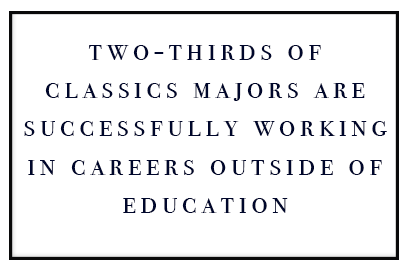Friends ask it. Parents ask it. Well-meaning aunts and uncles ask it. It is the dreaded question, “What can you do with a classics major?” Like many classics majors, you might feel unprepared to answer this question. For one, you are presumably studying classics because you enjoy it. You are focused on the deeply human insights that studying the classics offers into universal topics like love, loss, and leadership. Moreover, unless you are in the second semester of senior year, the question of a job probably seems off in the distance.

In fact, “job” is not the right word. It is too limiting, too temporary. While finding a first job after college can be a source of anxiety (and we will offer practical advice about how to set yourself up to get that first job), our focus here will be on preparing for a “career.” A career is a journey, and much like Odysseus’s, it will frequently take you into uncharted territory. The good news: a classics major provides you with a distinctive cluster of knowledge, skills, and dispositions that prepare you for the long-term.
Many of those well-meaning friends and family may assume that all you can do with a classics major is teach. Certainly, teaching K-12 is both an honorable and rewarding career choice, and one in high demand. We’ll say more about teaching later. For now, what might be more reassuring is that classics majors have a wide array of career options. They can be found in nearly every career sector. In fact, in a recent survey of over 600 classics majors, while education ranked, not surprisingly, number one, two-thirds of classics majors are successfully working in careers outside of education. To name only a few of the careers reported, recent classics grads include a midwife, NSA cryptanalyst, graphic designer, farm manager, police officer, and microbrewer.

Fig. 1: "'The Classics Tuning Project': Competencies, Value and Visibility of the Classics at Small Liberal Arts Colleges." The Classical Journal 115.3–4 (2020) 481–505.
Some of the most popular fields among classics majors are law, non-profits (including clergy), government, medicine, fine arts (including galleries and museums), knowledge creation and curation (includes research, publishing, libraries, and archives), computer science/tech, business, and financial services. After these top fields, the possibilities are limited only by your imagination and desire. A great place to start exploring is What Can I Do with This Major? This site lists the types of occupations available in different industries/areas of the market, types of employers, and strategies to prepare yourself for a career in each area.
It’s important to keep in mind that most job sectors involve an enormous variety of roles. For example, the education sector needs not only K-12 teachers but also people to work in administration, study abroad/international programs, library services, admissions, student support services, and English as a second language programs. Similarly, the non-profit sector hires people to work in administration, research, grant-writing, development/fundraising, programming, and volunteer coordination. And yet many non-profits are relatively small and need staff who can contribute to several areas at once. Classics majors are good at this kind of multi-tasking. Finally, don’t limit yourself to one market sector since many overlap. For example, one can group galleries and museums with fine arts, but they also share organizational structures, missions, and tasks with non-profits and with knowledge industries such as research, archives, and library and information science.
One topic we haven’t brought up yet is the possibility of pursuing a PhD in classics after you finish your BA. This is certainly one logical extension of the work you’ve done during your undergraduate and might be the right choice for you. We won’t be discussing that option in this guide, in part because there are already excellent resources out there on this exact topic (we recommend starting with Sarah Nooter’s pieces “How to Apply for PhD Programs” and “How to Decide on a Classics PhD Program.” Moreover, because this is the career path your professors followed, a conversation with them about the possibility of graduate school is, in most cases, the best place to start. Here we’ll be focusing instead on what you can do with a classics major besides become a professional classicist, since the majority of classics majors ultimately don’t enter the academy.
